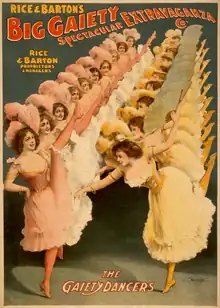Extravaganza
An extravaganza is a literary or musical work (often musical theatre) usually containing elements of burlesque, pantomime, music hall and parody in a spectacular production and characterized by freedom of style and structure. It sometimes also has elements of cabaret, circus, revue, variety, vaudeville and mime.[1] Extravaganza may more broadly refer to an elaborate, spectacular, and expensive theatrical production.[2]

A poster showing the chorus girls of a 1900 extravaganza.
19th-century British dramatist, James Planché, was known for his extravaganzas. Planché defined the genre as "the whimsical treatment of a poetical subject."[3]
The term is derived from the Italian word stravaganza, meaning extravagance.
See also
References
- "Encyclopædia Britannica online". Britannica.com. Retrieved 2014-08-23.
- Ewen, David (1957). Panorama of American Popular Music. Prentice Hall.
- Planché. The recollections and reflections of J.R. Planché (Somerset herald): a professional biography (1872), Vol. II, p. 43
This article is issued from Wikipedia. The text is licensed under Creative Commons - Attribution - Sharealike. Additional terms may apply for the media files.